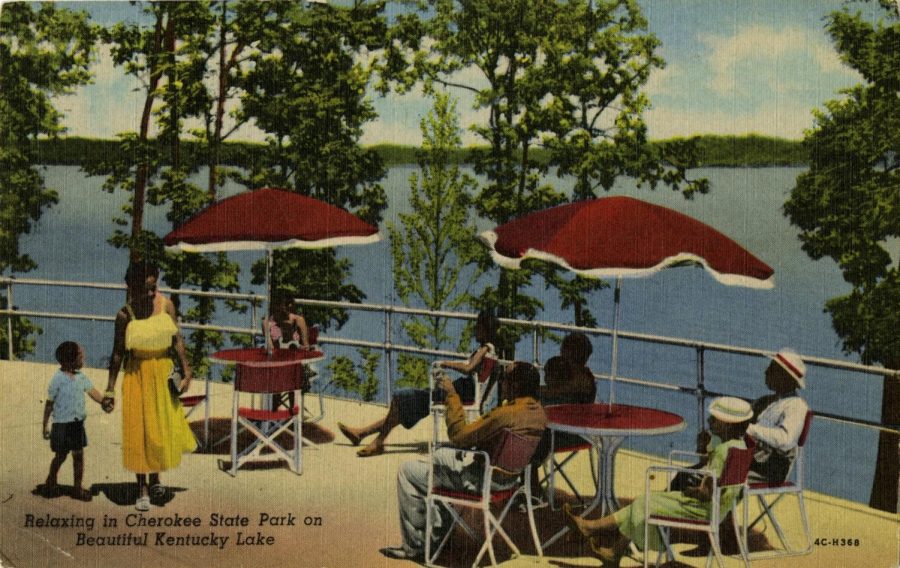Documentary focuses on Cherokee State Resort Park, Black history, segregation
Cherokee State Resort in Aurora, Kentucky was the only resort for people of color during segregation. (Photo courtesy of friendsofcherokeestatehistoricpark.org)
November 3, 2022
“A Legacy Lost & Found: Segregation in Recreation,” the documentary highlights the history of the Cherokee State Resort Park in Marshall County, once Kentucky’s only state park for Black people during the Jim Crow law era.
The documentary premiered in the Curris Center Theater on Thursday, Oct. 27 and was directed by Tammy Holmes, adjunct professor at Prairie View A&M University. It includes testimony from people who visited the park when it was open between 1951 and 1964. During the segregation era, the Cherokee State Resort Park was the only state park opened for Black visitors in Kentucky.
The screening was a partnership between the Office of Multicultural Initiatives, Student Leadership and Inclusive Excellence (OMI) and Cherokee State Resort Historical Park of Aurora, Kentucky. Students, faculty, staff and community members attended the event, along with the documentary’s director, executive producer and cinematographer.
OMI aims to bring together students from diverse backgrounds and is designed to promote student retention “through an innovative structured program that supports students from freshman year and on to graduation,” said OMI Faculty Liaison Alicia Carthell.
Carthell said the partnership aimed to educate viewers about the historical significance of Cherokee Park.
“There was a deep desire to educate people about how Black people in the United States were relegated to parks such as Cherokee Park because many people, even those who live in Kentucky, are unaware of the park’s history,” Carthell said. “We will continue to work with the Friends of Cherokee Park as future opportunities become available.”
Located within Kenlake State Resort Park, the 300-acre Cherokee State Resort Park contained a beach, rental cottages, a kitchen and a dining hall. Though the federal Civil Rights Act came a year later, the park closed in 1963 when former Kentucky Gov. Bert Combs signed an executive order to integrate the state’s park system.
In the documentary, Associate Professor of History Brian Clardy said Cherokee Park was a place for Black Americans to enjoy recreation as equals but also acknowledged the risk of violence associated with visiting.
“You had to really, seriously be prepared,” Clardy said. “What if your car breaks down? What if it breaks down in the sundown town?”
The documentary notes that about 10,000 so-called “sundown towns” had emerged across the country by the 1970s. In these communities, white residents excluded non-white people from remaining in town after sunset through discriminatory laws, intimidation or violence. Black families, though allowed to visit Cherokee State Resort Park, sometimes faced intimidation and violence for doing so.
Clardy said the history of segregation in the South is too recent to be buried.
“There’s some people in this society that would like to take us back to that,” Clardy said. “It ain’t going to happen, not with this generation.”
Carthell said viewers of the documentary should take away an understanding that the country has come a long way but still has work to do in promoting inclusion.
“After watching the documentary short, viewers were left with insight into the rich yet disturbing history of the Cherokee Park area and…witnessed the struggles that Black people had to deal with in their quest for inclusion through recreation,” Carthell said. “Of course, there was no inclusion, as the park was one of many representations of ‘separate but equal.’”
SG Carthell, executive director of OMI, said he encourages everyone to watch the documentary and research the history of the park area in Kentucky.
“History like that of Cherokee Park reminds us of the cultural divisions that existed and those that still exist today,” SG Carthell said.
The park was abandoned until 2002, when it became a venue for weddings and other activities. It received $50,000 in federal funding toward programming to share its history in July 2021. The documentary also highlights Gov. Andy Beshear’s proclamation of Cherokee State Park Day on Nov. 18, 2021.
Civil rights activist Charles Neblett said in the documentary the park was a part of those who experienced it.
“We’ve got to hand this down to our younger people, and let them understand who they are, who they really are,” Neblett said.
achuppe@murraystate.edu



























































































